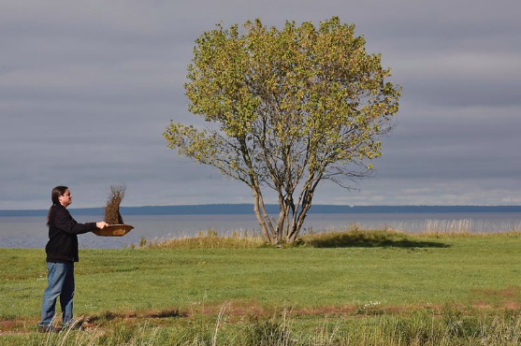Earth Mover: Sean Sherman
Now, he is working on a full-fledged Native American restaurant slated for 2019 in Minneapolis and the North American Traditional Indigenous Food Systems
Earth Mover: Sean Sherman
Now, he is working on a full-fledged Native American restaurant slated for 2019 in Minneapolis and the North American Traditional Indigenous Food Systems

Sean Sherman, a member of the Oglala Lakota tribe in South Dakota, wrote a book to help spread the word - and deliciousness - of Native American cuisine.Heidi Ehalt
In 2014, the enterprising chef launched Sioux Chef (sioux-chef.com), a mini culinary empire founded on the idea of digging up and popularizing pre-contact foods. Now, he is working on a full-fledged Native American restaurant slated for 2019 in Minneapolis and the North American Traditional Indigenous Food Systems (NATIFS), a non-profit incubator raising up food heroes in tribal communities.
He’s at the forefront of the indigenous food movement: Sherman co-launched the Sioux Chef with his partner Dana Thompson as a catering company. Soon after, came the food trucks, a Kickstarter restaurant project (the most-funded restaurant on the platform), educational workshops, speaking gigs, and the book. Last year, the duo banded with other chefs, ethnobotanists, food preservationists, and artists, across the nation to fuel NAFTIS, which aims to increase access to and knowledge of pre-contact foods. “No matter where you are in North America, there’s indigenous history, culture, and food there,” he says. “We just want people to realize that.”
He uses food to fight disease: A member of the Oglala Lakota tribe in South Dakota, Sherman witnessed how an over-reliance on government-funded, sugar-and salt-laden commodity foods, led to disproportionately high rates of diabetes and kidney disease within reservations. He aims to buck the trend by championing pre-colonial foods, which are mostly absent of dairy, wheat flour, cane sugar, beef, pork, and chicken. “Teaching people that it’s cool to reclaim cultural foods is going to be way more effective than telling people just to eat healthy,” he says. “There’s a sense of pride that comes with eating our own foods.”
He doesn’t follow a one-size-fits-all approach: NAFTIS helps tribes build community-specific farms, production facilities, and restaurants by any means necessary (grant writing assistance, fundraising, technical training). “Each business will be unique. It will represent the particular land, history, culture, people, and stories of the area,” he says. At the heart of the organization is a series of Indigenous Food Hubs (complete with a restaurant and an educational facility) which will be planted in urban areas. From there, the group can help build out other businesses – from farms to eateries – within tribal communities near the city. “We believe in redesigning the landscape to put food everywhere,” he says.

He crosses borders: “We don’t only want to affect the U.S., but also Canada and Central America,” he says. Sherman designed the program with scale in mind, drawing from his experience with the restaurant franchise model. “You have the hub where all the calls are made, then utilize a lot of specialists – resources and people on the ground – to build satellite teams,” he says.
He wants to change the story: For his cookbook, which hit shelves late last year, Sherman interviewed dozens of elders from different tribes. “There’s a colonial mindset of ignoring the past, but I think it’s important for anyone, native or otherwise, to understand that there’s a much deeper history across North America,” he says. “Aside from the tragedy, there are generations of knowledge that are extremely valuable – especially compared to, you know, 150 years of colonial knowledge.”
Follow us
This work is licensed under a Creative Commons Attribution-NoDerivatives 4.0 International License.
Want to republish a Modern Farmer story?
We are happy for Modern Farmer stories to be shared, and encourage you to republish our articles for your audience. When doing so, we ask that you follow these guidelines:
Please credit us and our writers
For the author byline, please use “Author Name, Modern Farmer.” At the top of our stories, if on the web, please include this text and link: “This story was originally published by Modern Farmer.”
Please make sure to include a link back to either our home page or the article URL.
At the bottom of the story, please include the following text:
“Modern Farmer is a nonprofit initiative dedicated to raising awareness and catalyzing action at the intersection of food, agriculture, and society. Read more at <link>Modern Farmer</link>.”
Use our widget
We’d like to be able to track our stories, so we ask that if you republish our content, you do so using our widget (located on the left hand side of the article). The HTML code has a built-in tracker that tells us the data and domain where the story was published, as well as view counts.
Check the image requirements
It’s your responsibility to confirm you're licensed to republish images in our articles. Some images, such as those from commercial providers, don't allow their images to be republished without permission or payment. Copyright terms are generally listed in the image caption and attribution. You are welcome to omit our images or substitute with your own. Charts and interactive graphics follow the same rules.
Don’t change too much. Or, ask us first.
Articles must be republished in their entirety. It’s okay to change references to time (“today” to “yesterday”) or location (“Iowa City, IA” to “here”). But please keep everything else the same.
If you feel strongly that a more material edit needs to be made, get in touch with us at [email protected]. We’re happy to discuss it with the original author, but we must have prior approval for changes before publication.
Special cases
Extracts. You may run the first few lines or paragraphs of the article and then say: “Read the full article at Modern Farmer” with a link back to the original article.
Quotes. You may quote authors provided you include a link back to the article URL.
Translations. These require writer approval. To inquire about translation of a Modern Farmer article, contact us at [email protected]
Signed consent / copyright release forms. These are not required, provided you are following these guidelines.
Print. Articles can be republished in print under these same rules, with the exception that you do not need to include the links.
Tag us
When sharing the story on social media, please tag us using the following: - Twitter (@ModFarm) - Facebook (@ModernFarmerMedia) - Instagram (@modfarm)
Use our content respectfully
Modern Farmer is a nonprofit and as such we share our content for free and in good faith in order to reach new audiences. Respectfully,
No selling ads against our stories. It’s okay to put our stories on pages with ads.
Don’t republish our material wholesale, or automatically; you need to select stories to be republished individually.
You have no rights to sell, license, syndicate, or otherwise represent yourself as the authorized owner of our material to any third parties. This means that you cannot actively publish or submit our work for syndication to third party platforms or apps like Apple News or Google News. We understand that publishers cannot fully control when certain third parties automatically summarize or crawl content from publishers’ own sites.
Keep in touch
We want to hear from you if you love Modern Farmer content, have a collaboration idea, or anything else to share. As a nonprofit outlet, we work in service of our community and are always open to comments, feedback, and ideas. Contact us at [email protected].by Hannah Saulters, Modern Farmer
September 19, 2018
Modern Farmer Weekly
Solutions Hub
Innovations, ideas and inspiration. Actionable solutions for a resilient food system.
ExploreExplore other topics
Share With Us
We want to hear from Modern Farmer readers who have thoughtful commentary, actionable solutions, or helpful ideas to share.
SubmitNecessary cookies are absolutely essential for the website to function properly. This category only includes cookies that ensures basic functionalities and security features of the website. These cookies do not store any personal information.
Any cookies that may not be particularly necessary for the website to function and are used specifically to collect user personal data via analytics, ads, other embedded contents are termed as non-necessary cookies.